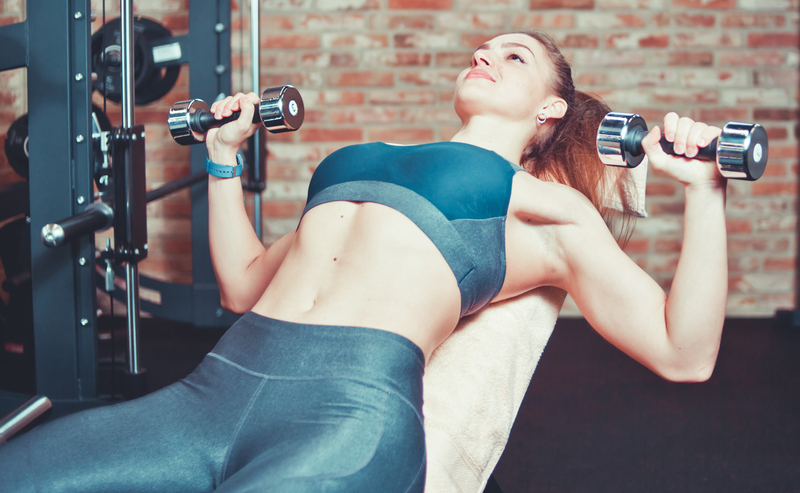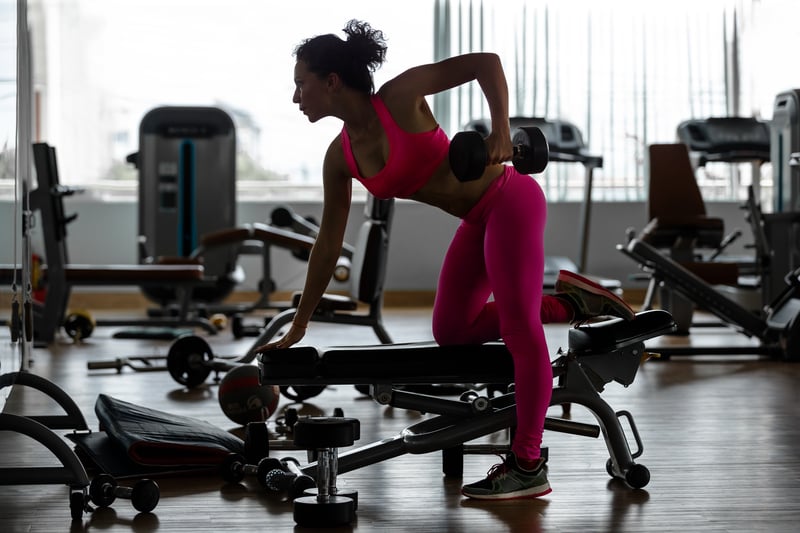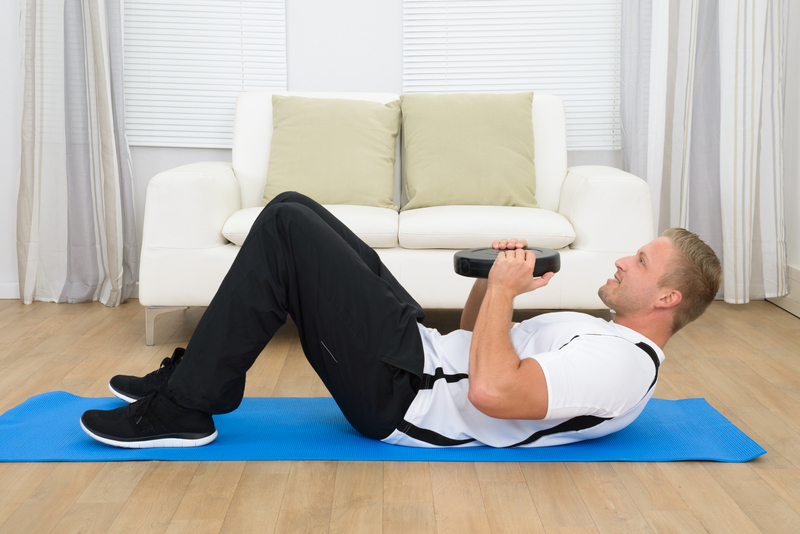Gain Lean Muscle with This Lightweight Dumbbell Workout

You’re going to get out what you put in with anything you do, and that’s true when it comes to a lightweight dumbbell workout. You don’t have to go heavy to build muscle or strength. You can absolutely do it with light weights, but there is a secret formula to follow.
Why Should I Lift Weights?
There are a lot of great reasons to lift weights, such as:
- To combat the natural attrition of muscle mass that comes with aging.
- To build lean muscle tissue, which is metabolically active. This means a faster metabolism.
- To get stronger.
- To prevent weight gain and burn off body fat.
- To increase your bone density and stave off osteoporosis.
- To improve your posture and support your body and organs.
Do I Have to Lift Heavy Weights to Gain Muscle?
If you’re interested in lifting weights but you don’t want to or are afraid to lift heavy weights, you’re in luck. Putting on lean mass and enjoying the other benefits of weight lifting is possible when you do a lightweight dumbbell workout. It all comes down to volume and fatiguing the muscle.
A study published in the International Journal of Exercise Science explains:
“The results of this study demonstrate that both High-Frequency Training (three sets on three occasions per week) and Low-Frequency Training (nine sets on one occasion per week) produced similar improvements in lean mass and strength in these 19 active men and women, following an eight-week training period.”
And another study done at McMaster University and published in the Journal of Applied Physiology notes:
To build lean tissue with light weights, you need to lift until you can’t lift the weight again. “Fatigue is the great equalizer here,” says Stuart Phillips, senior author of the study and professor in the Department of Kinesiology. “Lift to the point of exhaustion, and it doesn’t matter whether the weights are heavy or light.”
Adopt This Lightweight Dumbbell Workout
As always, you’ll want to start with a nice warmup before moving into your weight-training exercises. To get maximum effectiveness out of a lightweight dumbbell workout, you’re going to need to focus on volume. That means high repetitions until your muscles are so tired you can’t do another full rep. It’s only by going to exhaustion that you’ll be able to put on the lean muscle you seek.
So, what is the rep range you should use? Try starting with between 25 and 30 repetitions for each set. If you can easily do 30 reps with the weight you’re using, then you need to pick a slightly heavier weight. It may take some trial and error before you get it right, and this is normal. You may want to keep track of the amount of weight you’re using for each exercise in a journal, so you know where to start each time. And, on the flip side, if you struggle to get to 20 reps, then go a little lighter with your weight selection.
Do this routine three times a week. Choose a weight that allows you to get between 25 and 30 repetitions, but just barely. Those last few reps should be almost impossible.
1. Incline Dumbbell Presses

Start on an incline bench, feet flat on the floor, and a dumbbell in each hand. Bring the dumbbells up next to your shoulders (slightly forward), palms facing forward. Press the weight upward until your arms are straight, squeezing your chest muscles. Lower the weight back to the start, and repeat 25 – 30 times or until failure.
2. Dumbbell Shoulder Press

Start by sitting on a bench with an upright back. With a dumbbell in each hand, palms forward, bring the dumbbells up to shoulder height. Press the weights upward until your arms are fully straightened and the dumbbells touch at the top. Lower back to the starting position and repeat 25 – 30 times or until failure.
3. Triceps Kickbacks
Begin with your right knee and right hand on the bench, bending at the waist. With a dumbbell in your left hand, keeping your elbow at your side and your arm bent at 90 degrees, straighten your arm by pushing the weight back until your arm is parallel with the ground (and straight). Slowly bend at the elbow to bring the weight back to the start and repeat 25 – 30 times or until failure.
BREAKING: Forget Taking Collagen, Try This 21-Second Trick for Healthier Skin & Hair Instead
4. Bent-Over Dumbbell Rows

Start with your left hand and knee on a bench and hold a weight in your right hand, bending at the waist. With a dumbbell in your right hand, let your arm hang straight down. Next, bend your elbow, moving it back and up to lift the weight until it is at hip level. Lower the weight back to the start and continue to complete 25 – 30 repetitions or until failure.
5. Forward Lunge with Weight
Start by standing with a light dumbbell in each hand. With your arms hanging straight down, take a big step forward with your right leg, and bend all the way forward at the knee. Make sure to keep your back and arms straight with your head up. Next, push through your right heel to propel yourself back up to standing. Repeat on the opposite leg. Do 25 – 30 repetitions for each leg or until failure.
6. Sumo Dumbbell Squat
Start by holding a dumbbell from the end with both hands in front of you, arms straight down. Next, place your feet much wider than hip-width apart and point your feet outward. Squat down by bending at the knees, kicking your hips back, and bringing the weight toward the floor. Make sure you keep your back and head straight. Push back up through your heels to standing. Repeat 25 – 30 times or until failure.
7. Calf Raises with Dumbbells
With a dumbbell in your right hand and your left hand on a sturdy surface, stand on an elevated platform (such as on stairs). Scoot your right foot back so your heel is off the surface. Lower your leg/heel below the level of the platform to feel a good stretch through your calf. Next, move your body up onto your tiptoes and squeeze the calf muscle. Do 25 – 30 repetitions (or to failure) on your right side and then repeat on the left.
8. Weighted Crunches

Lie on your back with your knees bent. Hold a weight at each end and place it on your upper chest. Next, looking at the ceiling, raise your upper body off the ground, squeezing your abs. Hold this position for a count of three and then return to the start. Repeat 25 – 30 times or until failure.
Last, but definitely not least, if you’re going to put in all this hard work with your lightweight dumbbell training, make sure you feed your body the nutrition it needs to build the muscle you’re seeking. Get plenty of protein daily and space protein meals regularly throughout your day. With some light weightlifting and the right diet plan, you can make big changes in terms of muscle strength and size.




 US Doctor: "Eating This Every Day Can Snap You Into Ketosis"
US Doctor: "Eating This Every Day Can Snap You Into Ketosis" 3 Key Nutrients to Help Lubricate Your "Tin Man" Joints
3 Key Nutrients to Help Lubricate Your "Tin Man" Joints AVOID Plant-Based Protein Powders (unless...)
AVOID Plant-Based Protein Powders (unless...)

